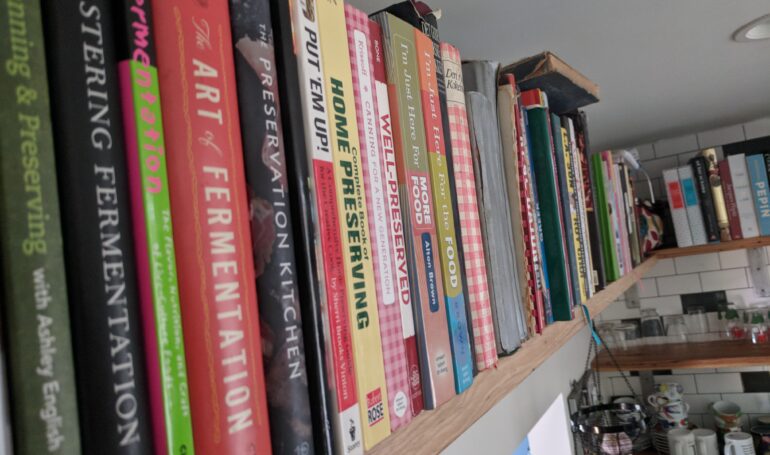
Cooking from Cookbooks: A new project
I own a lot of cookbooks. They overflow the special, extra long shelf I had built for them when we remodeled the kitchen. They are everywhere. I compulsively buy cookbooks on a whim. I try to make this impulsive habit less costly by buying electronic cookbooks. That “One Click” feature makes satisfying that impulsive itch easy – too easy. In a flash, before my app says the book downloaded, the satisfaction vaporizes. Turns out, I don’t like the format for cookbooks. I never go back to those electronic morsels to cook great meals.
Wait.
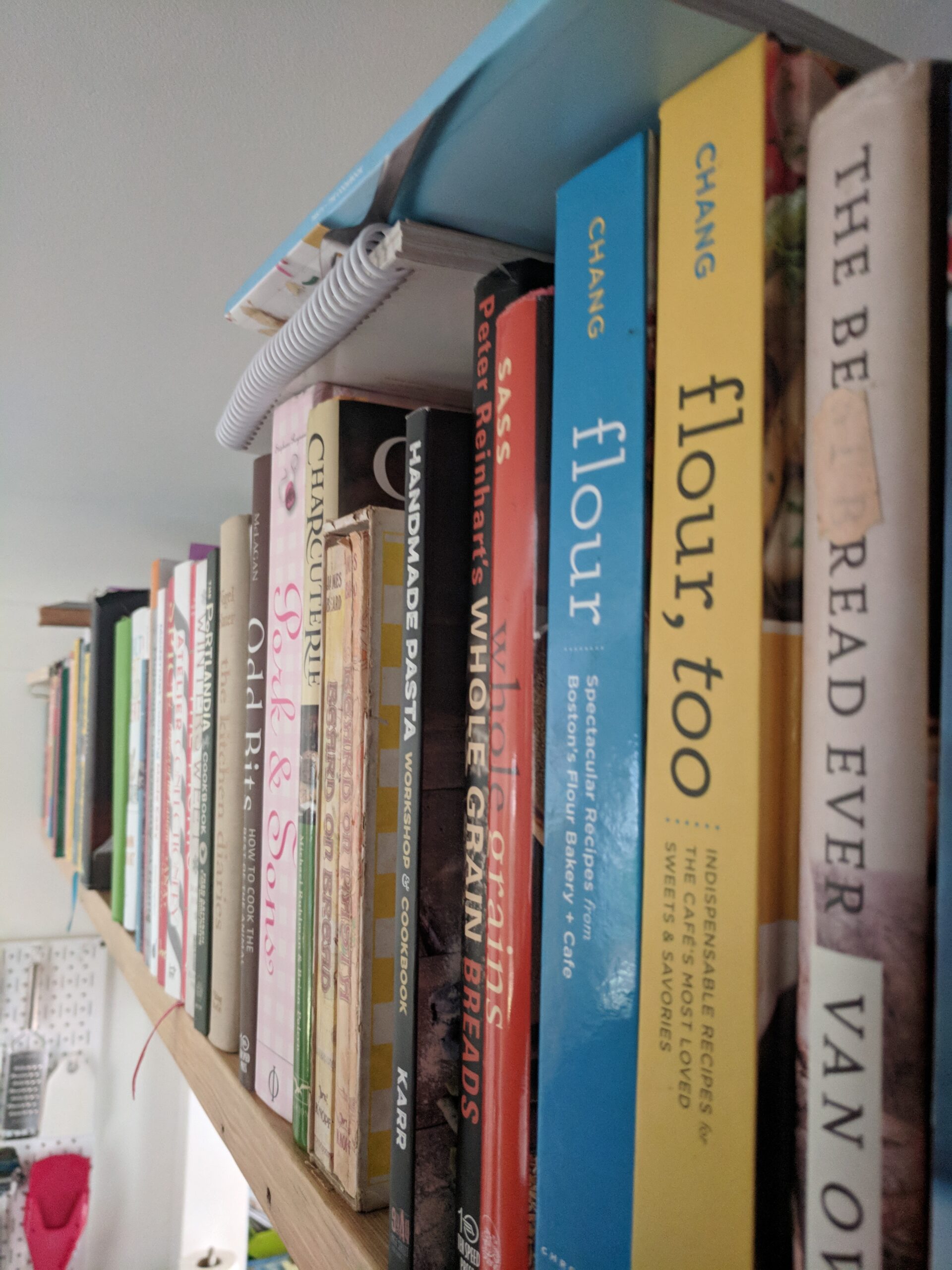
It turns out, after admiringly flipping through a newly-purchased, hardbound morsel, I don’t ever go back to my physical cookbooks to cook great meals. I even mark interesting recipes with sticky notes or sometimes leave a book open to a recipe I like. When a new book arrives, the previously-new cookbook closes and gets filed away. Sometimes, I re-purpose those sticky notes for the new-new cookbook. Despite having so many cookbooks, I cook great meals without them. I improvised almost all meals based on what I find in the refrigerator and cupboards. While hunting through cabinets to find flavor inspiration, I often Google ingredients for ideas. I glance and recipes on my phone by the handful, then I cook up (pun intended) my own concoction. Rarely, except in the cases of cheesemaking and canning, do I reach for one of my many cookbooks for impromptu research and recipe design. The search function on my books is of an archaic format called “Table of Contents” and “Index.”
I do not aggregate my collection into a single searchable index by ingredient or flavor or cuisine type. So, in order to research recipes for an ingredient, I need to select a cookbook based on cuisine or author or prettiness of the cover. Then, I have to search each book’s table of contents and index for the ingredient, flip through the book and review each recipe and its ingredients. Sometimes, cookbooks do not even list the ingredient of interest because it is not the main ingredient. So, I don’t know if I am missing something really awesome. Typically, I do not have all the ingredients to replicate the recipe exactly as written. So, I decide if I want to make a close (or not-so-close) facsimile from ingredients lurking in my kitchen.
On the other hand, an internet search allows me to see recipes from many different sources all at once. There are usually pretty pictures for quick reference. With a few thumb moves, I can scan a dozen recipes for ideas. No publisher is making a judgement call on which ingredients are important enough to make the cut for listing in the index: all ingredients are available for searching. Furthermore, I can search on combinations of ingredients with the hope of finding that one perfect recipe that fits exactly what my pantry possesses.
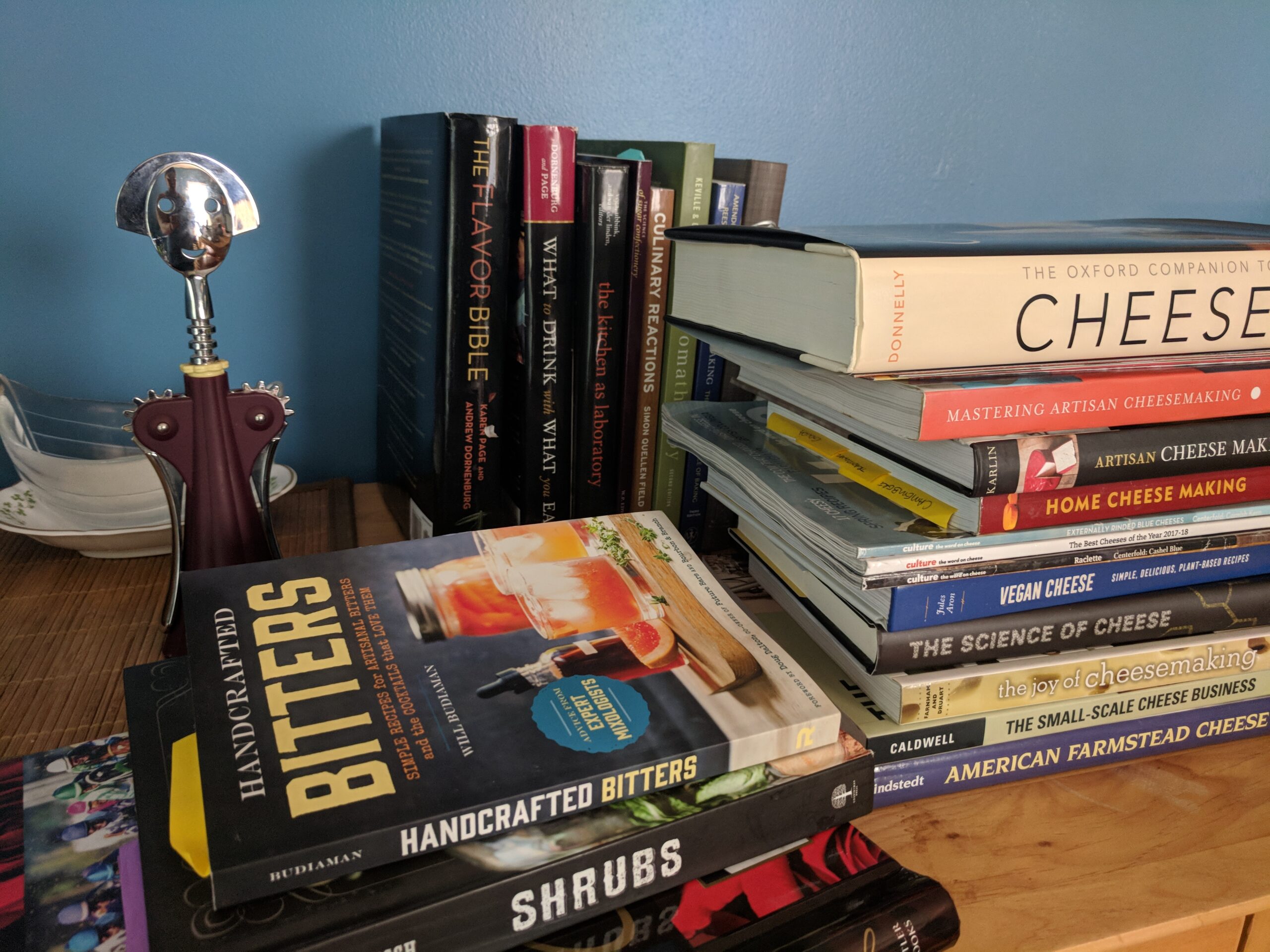
Admittedly, many of the recipes I find on the internet are crap. There are several sites where community members contribute recipes. While there are a few gems among these, this is where I fully appreciate the editors and publishers. Many submissions are poorly written and, I believe, untested. Community members rate the recipes and even highly rated recipes seem a bit haphazardly written to me. That is fine; I am rarely looking for lessons on technique. I paid a culinary an obscene amount of money to provide me that skill. I am mostly there to look for flavor combinations. Ultimately, though, I tend to avoid these sites and opt to click through to reputable sites which usually means one with an associated paper publication where there is an editor involved.
Here is where I go on a slightly off-topic side trip into technology. Unfortunately, the search algorithms readily dish these community sites to the top of searches. They gain top spots on search engine lists through money. First, they attract advertisers through promises high click rates which means high visibility of adverts. Clicks are achieved through payments to search engines for advertising the site itself. As a result of advertising, more people click and the more people click, the more the search engine recognizes the site as popular and the higher the site appears on search results. Its like a perpetual motion, advertising Ponzi scheme – pay for ads begets pay for search results begets more clicks begets better search results begets more clicks begets more advertising money.
I only bring this up this techie stuff because top search results are often confused with higher quality. As a result, these community sites are sometimes perceived to have great recipes. The problem is when people cook from them and get poor results, they think they did a bad job of cooking. Reality, the recipe was probably crap. It is not a top search result because it is good, it is a top search result because some whiz of a programmer and some rich advertiser, neither of whom probably cook at all, got it to the top because they know how to cook up software coding and SEO.
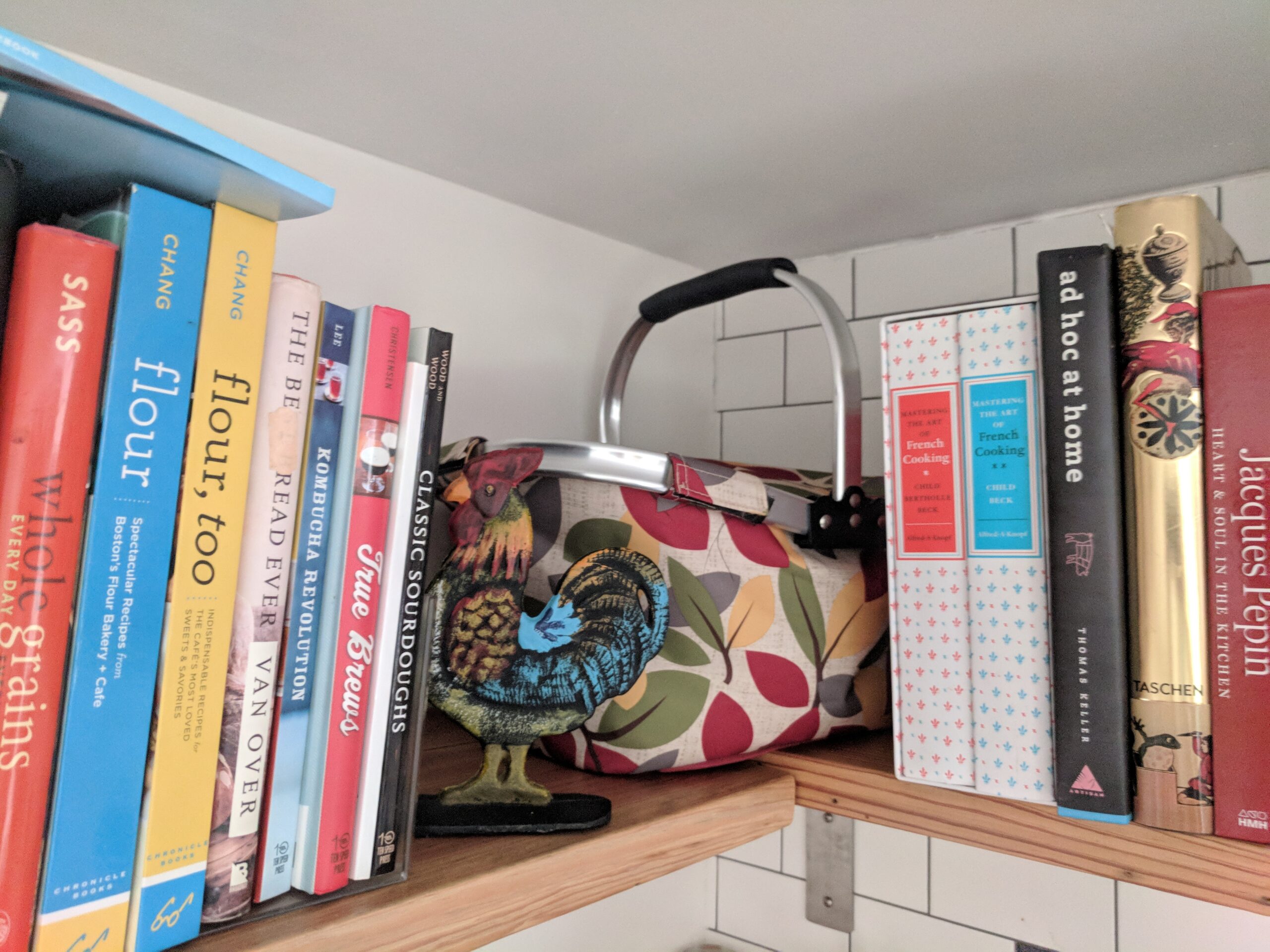
That is not to say recipes in cookbooks are great or well-written. However, they are typically consistent and tested. An editor and publisher ensures they are articulate and recipe testers cook the recipes and provide feedback to the author. You probably notice I am carefully parsing words here. I am not saying recipes in cookbooks are better than recipes on the internet. I don’t think cookbooks necessarily offer better dishes: the writing, formatting and consistency are better. When I was part of a cookbook club, I had the pleasure of hosting potlucks with a group of avid home cooks. Although members admitted to not usually following recipes when cooking at home, they were all were skilled at cooking and reading recipes. For the cookbook club, each person diligently followed the recipes. While the goal was to bring a dish that represented the author’s vision to a T, it was surprising that most people had to adjust the recipes in order to make them work at all.
This is not unusual. A cookbook author tries to provide enough instruction to get the dish made, but not so much it overwhelms or turns off the reader. They also have to write what is basically an instructional textbook for an audience of cooks with widely variable skill levels and equipment. A paradox for the recipe writer is that a recipe with fewer details and less in-depth instruction requires a cook to use more skills to fill in what is missing. However, people with fewer cooking skills find these exact recipes less intimidating. They cannot do what my cookbook club peers do – improvise when things aren’t turning out as expected. The result is when people cook from these sparser, less intimidating recipes and get poor results, they think they did a bad job of cooking. Just like cooking from a poorly written internet recipe.
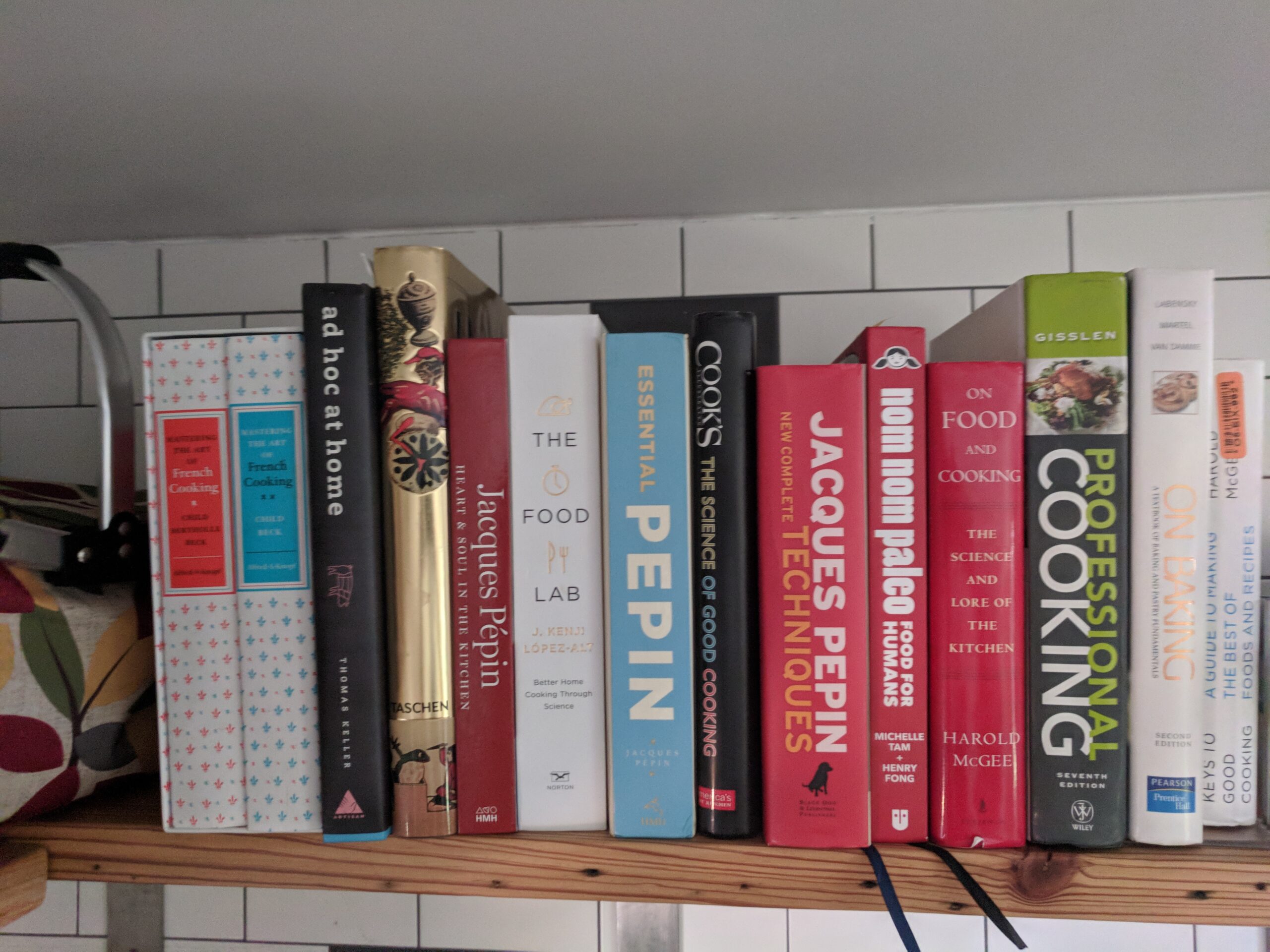
Anyway, I am getting way off topic here. I had a topic in mind and as I started meandering through writing. I somehow backed myself into a treatise on why cooking from recipes generally sucks. I don’t fell like abandoning all I have written today: that would take this whole blogging thing way too seriously. So, in a nutshell, people comfortable with their cooking skills, use those skills to improvise and don’t really learn new skills. Conversely, people not-so-confident with their cooking skills follow recipes with too little information, get bad results and don’t gain any more confidence.
With that said, back to my where I started. I have this huge cookbook collection and I rarely cook from it. So, I am going to do something totally unoriginal – cook from my cookbooks and write about it. Heidi Swanson started her blog 101Cookbooks for this very reason, which, amazingly for her, resulted in multiple physical cookbooks and tons of accolades including a a James Beard Award. One can only dream, but I don’t imagine that dream repeating itself with this idea. I do, however, envision, I will get some use out of all the money I invested in my cookbook collection. Perhaps, I will find reason to part with a few that I don’t like the results to make room for a new set of books.
 Since this post got a little long with a little too much general cookbook and recipe writing philosophy, I will wait for another day to jump into that first recipe and talk about the cookbook. I am not going to start small. Because, at heart, I am a techie nerd still, I am going to start with the mother of technical tomes on home cooking – Modernist Cuisine at Home by Nathan Myhrvold. It is a ridiculously out-sized book – figuratively and physically. So, you have that to look forward to.
Since this post got a little long with a little too much general cookbook and recipe writing philosophy, I will wait for another day to jump into that first recipe and talk about the cookbook. I am not going to start small. Because, at heart, I am a techie nerd still, I am going to start with the mother of technical tomes on home cooking – Modernist Cuisine at Home by Nathan Myhrvold. It is a ridiculously out-sized book – figuratively and physically. So, you have that to look forward to.
Happy cooking and recipe hunting!
One Comment
[…] kick off my this Cooking from Cookbooks project, I have decided to set the bar high and take on Nathan Myhrvold’s heafty tome, The […]